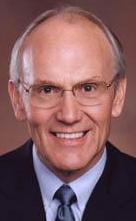Maybe the Northwest political blog news today out of Rasmussen Reports will emerge from its new poll of the Oregon Senate race, in which Republican incumbent Gordon Smith takes 48% of the vote against either of the two Democrats, Jeff Merkley (who gets 30%) and Steve Novick (35%). And maybe that's worthy of note, largely as an indicator of ongoing softness in Smith support.
And, as in a good many other states, Democrat Barack Obama would be projected to defeat Republican John McCain in Oregon, but McCain would be projected to beat Democrat Hillary Clinton.
But we spent more time with Rasmussen's markets, a sort of futures market - guesses on who will win. A number of national political markets have sprung up in recent years, with focus on the presidential level. Rasmussen's are more numerous and detailed. In addition to markets for how each state will vote in the November presidential (the ongoing primary and caucus states too well of course), there are also markets for U.S. Senate and governor races around the country. You can read the "buy contract" numbers almost, loosely, like percentages, since they add up to around 100, not as percentages of votes, but in terms of probability of a win.
In the Oregon Senate race, for example, the bid is 75 if you want to buy a contract on the proposition that the Republican nominee will win the general election, and 24 if you think the winner will be a Democrat. You can read it as what those (anonymous) participants thought were the odds of a victory by each side.
In the Idaho Senate race, the Republican contract is bid at 87.1, and the Democratic at 13.1.
For governor of Washington, the bidding is a little closer: 62.2 for the Democrat, 20 for the Republican.
For the general election for president? In Idaho, it's Republican 90 to Democrat 2.5; Oregon Democrat 80 and no current Republican bid; Washington Democrat 80 and Republican 10.
Nothing definitive or scientific here, but something worth tracking current and often-changing lines of thought.

 Larry Craig
Larry Craig The sweep for Illinois Senator Barack Obama was overwhelming. He took 43 of Idaho's 44 counties, and the one lost - Lewis, in the north-central - is one of the smallest. (No obvious answers to that outlier, other than that Lewis is unusual in that it is small, remote, rural and still has a substantial local Democratic core, which may retain some loyalty to the Clinton Administration.)
The sweep for Illinois Senator Barack Obama was overwhelming. He took 43 of Idaho's 44 counties, and the one lost - Lewis, in the north-central - is one of the smallest. (No obvious answers to that outlier, other than that Lewis is unusual in that it is small, remote, rural and still has a substantial local Democratic core, which may retain some loyalty to the Clinton Administration.) Dave Reichert
Dave Reichert Bill Sali
Bill Sali